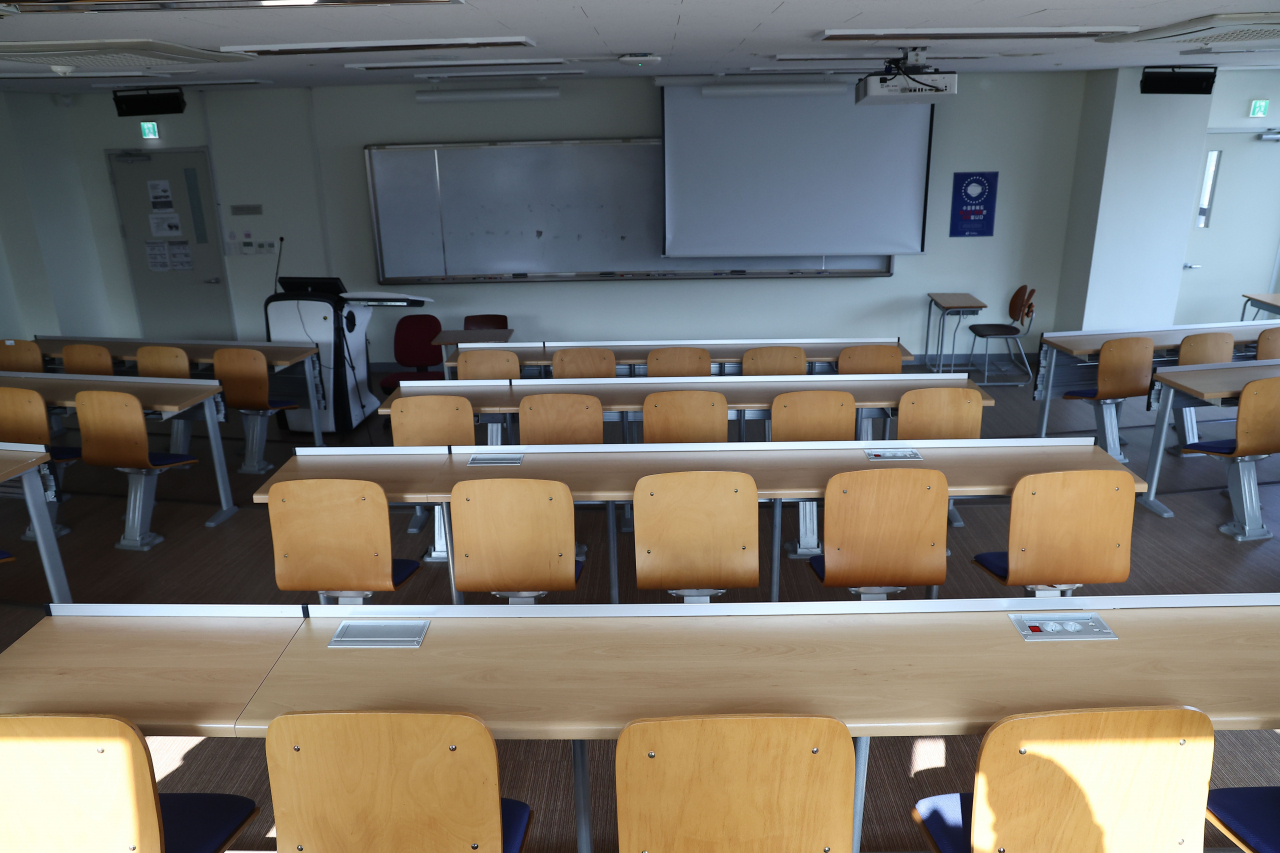 |
A lecture hall at a medical school in Gyeonggi Province is empty on Thursday morning, as medical students have taken a leave of absence in protest against the government's policy to expand the medical enrollment quota. (Yonhap) |
Of the 2,000 new seats for medical schools being floated by the South Korean government, universities in provincial areas are to get 80 percent, with the rest for schools in Seoul and the vicinity, officials said Thursday, reaffirming the policy decision that has been facing fierce opposition from doctors since last month.
According to the government, the plan is to develop competitiveness in regional universities by increasing the number of medical students at those schools with relatively few such seats.
"We have not changed our policy of increasing the number of medical school seats for health care reform," a presidential office official said. "The government will unwaveringly pursue follow-up measures such as eliminating medical disparities between regions and strengthening essential medical care."
The Education and Health Ministries are operating a committee together that discusses the standards for allocation, based on the region and scale of the schools, while monitoring the number each university submitted to increase its medical school quota, said an Education Ministry official. The official said, however, the specific number has yet to be confirmed.
The government on the same day pledged it would help major hospitals in noncapital regions elevate their quality of medical services to match those of the "big five" in Seoul -- Asan Medical Center, Samsung Medical Center, Severance Hospital, Seoul National University Hospital and Seoul St. Mary's Hospital. The plan involves offering having the National Health Insurance Service pay doctors higher fees for services offered at hospitals in regional areas.
The government has been testing this method by offering 550,000 won ($420) more for each child delivered medical centers outside the Greater Seoul area that hire a full-time obstetrician and have a delivery room.
The government plans to create a "medical map" that indexes medical demand and the availability of staff at regional hospitals to set the size of the additional fees for medical services they offer, which it says is a step to eliminate medical disparities between regions. It aims to implement the plan within the second half of this year.
The government will also allocate 1.3 trillion won over five years to support the medical treatment of young children with serious illnesses and to reduce hospital fees for babies under 2.
"The government will ensure that young children will not face any difficulties going to hospitals at night or on holidays," Minister Lee Sang-min said in a government response meeting to medical circles' collective action.
Professors from medical schools nationwide have begun to submit resignations in collective action, pressuring the government to seek a breakthrough in its current deadlock with junior doctors.
The Medical Professors Association of Korea will hold a meeting later this evening to discuss medical students being absent en masse and the situation regarding junior doctors not returning to work.
The president of the organization said if students participating in the walkout have to repeat a year of study and doctors are not able to return, professors could hand in voluntary resignations and halt practicing at university hospitals.
Medical professors from 19 universities are also making moves on a separate level, as they collect opinions from professors and teaching doctors to come up with a decision by Friday as to whether they will submit their resignations en masse.
The Seoul Administrative Court, meanwhile, held a hearing on Thursday of a case in which representatives of the faculty councils of 33 medical schools nationwide filed against the health and education minister to nullify the decision to increase the medical school enrollment quota.
The professors call the decision by the health minister, who does not have the authority to decide on increasing the number of students admitted to universities, "naturally invalid," and say the plan for 2025 school enrollment should come at least 22 months before the execution.







![[Today’s K-pop] Blackpink’s Jennie, Lisa invited to Coachella as solo acts](http://res.heraldm.com/phpwas/restmb_idxmake.php?idx=644&simg=/content/image/2024/11/21/20241121050099_0.jpg)